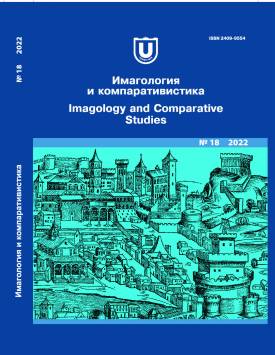Muslims and the Muslim world in the works of Anton Chekhov
The article provides a brief overview of the ideas about Islam and its adherents in Russian public thought of the 19th - early 20th centuries, as well as the policy of the Russian state in relation to this religion. Against this background, the characteristics given by Anton Chekhov to Muslim peoples at different stages of his work in prose and letters to friends and relatives are considered. Most often Chekhov’s works mention Turks, Tatars, Persians, less often Afghans, Circassians, Chechens, the Kirghiz. The development of the level of representation of an ethnic group is closely related to its estimated dynamics. If the ethnonym “Tatar” is often given a negative connotation, episodic characters in the writer’s stories are already devoid of negative characteristics, and the unnamed Tatar, the main character of the story “In Exile,” is a positive character. Contrasting his views with the egoistic anarchism of the exiled settler Semyon Chekhov in an artistic form embodies the idea of the opposition of individualism of the West and Eastern community. Chekhov’s experience of communication with real Muslims is reflected in the book Sakhalin Island and in his epistolary works. Objective assessments and respect for the Tatar people prevail here. In letters sent to relatives on the way to Sakhalin, Chekhov describes Volga and Siberian foreigners positively, as good, respectable, modest people “better than Russians,” according to a Russian assessor. In his texts, the writer actively used ethnonyms, ethnonymic adjectives, ethnophaulisms, ethnic stereotypes, images of representatives of Muslim peoples. The literary techniques Chekhov used to describe Muslim issues include ethnonymic synonyms and mixed ethnic, religious, class, and professional affiliations. When describing his characters, Chekhov pays much less attention to confessional differences in comparison with ethnic ones. In Islam itself, he sees no threat, but shares the popular opinion about the civilizational “backwardness” of the Muslim world. Asian stereotypes are represented by aggressive and wild Afghans, Persians, Circassians, and quite “decent Kyrgyz.” The characters’ traits largely depend on the genre of the work and the degree of detail of the image. The study of ethno-religious motifs in Chekhov’s works shows that his attitude to a person is always more positive than to a community, and the ethnic and confessional stereotypes he uses are grouped not so much around a nation, rather around an ethnonym (confessiononym). Such ethnic and confessional stereotypes can be classified as nominalistic, that is, they actively function in the culture, but lose their genetic connection with the corresponding community. The author declares no conflicts of interests.
Keywords
Anton Chekhov, ethnic stereotype in literary and epistolary works of writer, Chekhov in memoirs of his contemporaries, imagology, Islamic allusions in literature, ethnonymic units of secondary nominationAuthors
| Name | Organization | |
| Shatunov Yuri A. | Chuvash State Pedagogical University named after I. Y. Yakovlev | ushatunov@yandex.ru |
References

Muslims and the Muslim world in the works of Anton Chekhov | Imagologiya i komparativistika – Imagology and Comparative Studies. 2022. № 18. DOI: 10.17223/24099554/18/15
